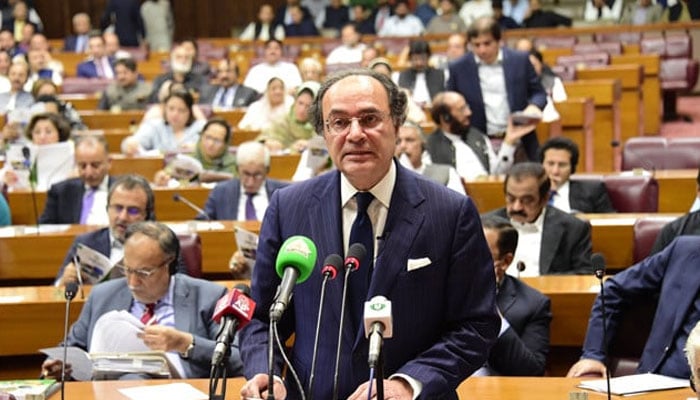Budget speech: clear and uplifting
Analytically, the speech presented a clear distinction between the real economic disease and its symptoms
Senator Muhammad Aurangzeb’s budget speech had a degree of clarity compared to past budget speeches and was somewhat uplifting unlike those of previous years.
Analytically, the speech presented a clear distinction between the real economic disease and its symptoms. According to the finance minister, the low-growth cycle was identified as a symptom, with extensive government intervention being the real disease. The minister’s solution is to move towards a more market-driven economy. Another issue identified by the minister was a consumption-based economy, for which his proposed solution is a shift towards an investment-based economy.
The speech conveyed two central messages with clarity: the importance of privatisation and the need to limit government intervention in the market. The finance minister emphasised that a market-driven economy would be more efficient and lead to sustainable growth.
Additionally, the budget took a firm stance against non-filers, implementing measures that are explicitly unfavourable to them. This approach is justified, as it aims to broaden the tax base and ensure compliance, ultimately fostering a more equitable and robust economic system. By promoting privatisation and reducing government interference, the speech outlined a clear vision for a more dynamic and investment-friendly economy in Pakistan.
The future direction for the FBR includes digitisation and progressive taxation, where the tax rate increases as taxable income rises. For both salaried and non-salaried individuals and associations of persons, there is no tax on income up to Rs.600,000. Above this threshold, non-salaried taxpayers face five progressive tax brackets ranging from 15 per cent to 45 per cent. Salaried individuals have a separate structure with five brackets ranging from 5.0 per cent to 35 per cent on income exceeding Rs600,000.
The focus of Budget 2024-25 is more on increasing taxes than on fostering growth. Successful economic models around the world prioritize economic growth, with taxation being a byproduct of that growth. These models recognise that stimulating business activity leads to a larger tax base and higher revenues without stifling economic progress. Unfortunately, this crucial element appears to be missing in our budget. By prioritising immediate revenue generation over long-term economic expansion, the budget may hinder Pakistan’s ability to achieve sustainable development.
Pakistan’s Budget 2024-25, while allocating over Rs3 trillion in subsidies and grants, fails to provide significant incentives to boost domestic corporate activity. This stands in stark contrast to neighbouring countries like India (30 per cent standard corporate tax rate) and Bangladesh (proposed 25 per cent rate for FY2024-25).
In fact, Pakistan’s effective corporate tax rate can reach nearly 50 per cent, making it one of the highest in the world. This disparity discourages investment and hinders Pakistan’s competitiveness in the global market.
Despite a clear diagnosis and a call for a market-driven approach, Budget 2024-25 prioritizes short-term revenue gains over long-term growth. By neglecting to incentivise domestic businesses and clinging to high tax burdens, Pakistan risks losing its competitive edge and stalling its path to sustainable development.In conclusion, while Senator Muhammad Aurangzeb’s budget speech presented a clear and somewhat uplifting vision for a market-driven economy, the budget misses the mark by focusing excessively on immediate tax hikes rather than fostering long-term economic growth. The high tax rates and lack of incentives for domestic corporate activity risk driving talent and investment away, ultimately hindering Pakistan’s economic competitiveness and sustainable development.To truly prosper, Pakistan must adopt a growth-oriented approach that encourages investment while ensuring a fair and efficient tax system.
-
 Princess Kate Talks About 'hard Conversations' With Kids Amid Andrew Drama
Princess Kate Talks About 'hard Conversations' With Kids Amid Andrew Drama -
 Prince William Mocked For Being ‘most Reluctant’ King-in-waiting
Prince William Mocked For Being ‘most Reluctant’ King-in-waiting -
 Prince William Makes Rare Admission After Andrew Arrest
Prince William Makes Rare Admission After Andrew Arrest -
 ‘Got A Lot Of People Gunning For Me’: Trump Makes First Comments On Mar-a-Lago Intruder
‘Got A Lot Of People Gunning For Me’: Trump Makes First Comments On Mar-a-Lago Intruder -
 What Countries Have A Say In Andrew Removal From Line Of Succession?
What Countries Have A Say In Andrew Removal From Line Of Succession? -
 How Did Luci4 Die? Police Probes 'BodyPartz' Sudden 'suspicious' Death
How Did Luci4 Die? Police Probes 'BodyPartz' Sudden 'suspicious' Death -
 King Charles Criticized By Princess Anne Over Andrew Drama
King Charles Criticized By Princess Anne Over Andrew Drama -
 Hailee Steinfeld Details Preparations Ahead Of Welcoming First Kid With Josh Allen
Hailee Steinfeld Details Preparations Ahead Of Welcoming First Kid With Josh Allen -
 Shocking Details Revealed About Gunman 'Austin Tucker' Shot Dead At Trump’s Resort 'Mar-a-Lago'
Shocking Details Revealed About Gunman 'Austin Tucker' Shot Dead At Trump’s Resort 'Mar-a-Lago' -
 Queen Camilla Meets Gisèle Pelicot, Sends Powerful Message To Victims As Andrew's Scandal Deepens
Queen Camilla Meets Gisèle Pelicot, Sends Powerful Message To Victims As Andrew's Scandal Deepens -
 Cancer-stricken King Charles At Breaking Point?
Cancer-stricken King Charles At Breaking Point? -
 Andrew Leaves King Charles No More Moves To Play: ‘Can’t Just Say We Got Nothing’
Andrew Leaves King Charles No More Moves To Play: ‘Can’t Just Say We Got Nothing’ -
 Sterling K. Brown Explains How Sharing His Kids' Photos On Social Media Can Keep Them Safe
Sterling K. Brown Explains How Sharing His Kids' Photos On Social Media Can Keep Them Safe -
 Keir Starmer Gives Major Advise To King Charles Amid Andrew Scandal
Keir Starmer Gives Major Advise To King Charles Amid Andrew Scandal -
 Nick Reiner Pleads Not Guilty In Famous Parents' Double Murder Which Shocked The World
Nick Reiner Pleads Not Guilty In Famous Parents' Double Murder Which Shocked The World -
 Benicio Del Toro On Losing Mom In Chldhood: 'I’m Still Dealing With It'
Benicio Del Toro On Losing Mom In Chldhood: 'I’m Still Dealing With It'




